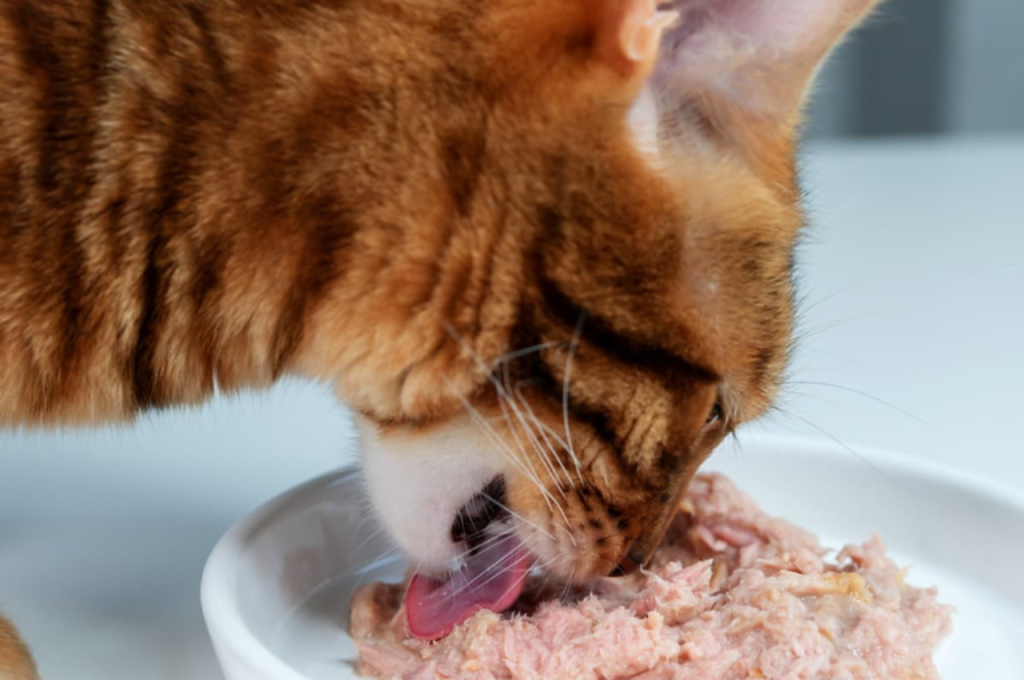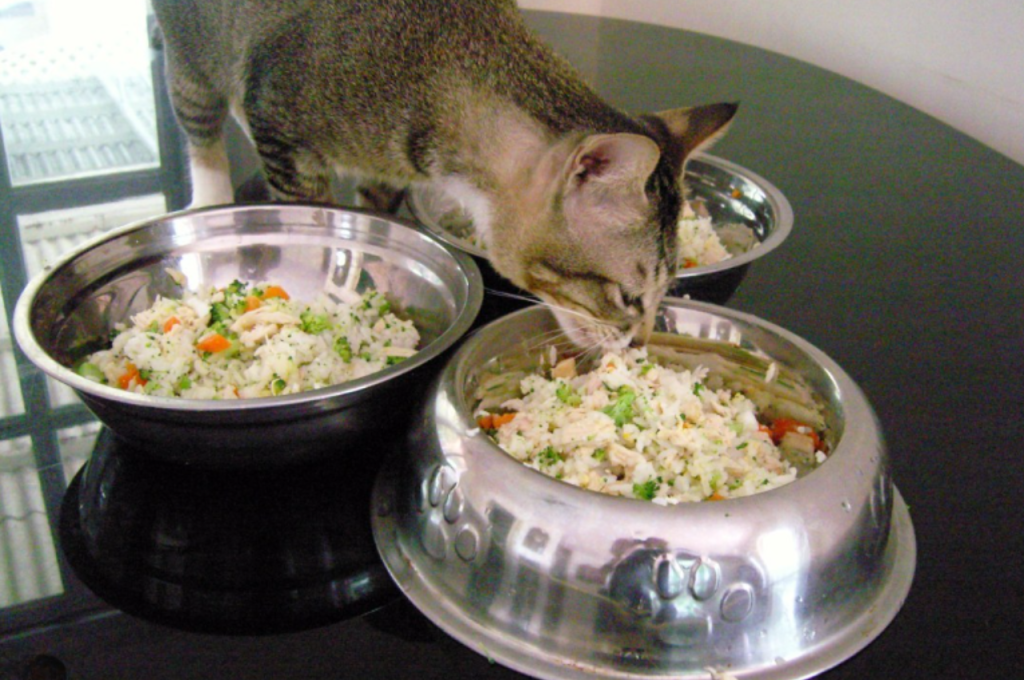Yes, tuna can be good for cats in moderation. It provides a good source of protein for the feline diet.
Many cat owners wonder whether tuna is a suitable treat for their furry companions. While tuna can be a nutritious addition to a cat’s diet, it should only be given in moderation due to potential risks such as mercury toxicity.
To ensure your cat’s well-being, it’s essential to feed them a balanced diet specifically formulated for their nutritional needs. We will explore the benefits and potential drawbacks of feeding tuna to cats and provide recommendations on how to introduce it safely into their diet.
Nutritional Needs of Cats
Cats require a balanced diet to meet their nutritional needs. While tuna is a popular treat for cats, it should be given in moderation due to its high mercury content, which can be harmful to felines. Opt for cat foods specifically formulated to provide the essential nutrients for your pet’s well-being.

Understanding Cat’s Dietary Requirements
Cats have specific nutritional needs to stay healthy and active. Proper nutrition is essential for their overall well-being. A balanced diet for cats should contain the right amount of proteins, fats, vitamins, and minerals to support their growth and development. Cats are obligate carnivores and require a diet high in animal-based protein. Cats need proteins for energy and muscle health.
Role of Protein, Fats, and Vitamins for Cats
Proteins: Essential for cats’ overall health and well-being.
- Support muscle development and growth
- Aids in the repair and maintenance of tissues
Fats: Provide a concentrated source of energy in a cat’s diet.
- Essential for healthy skin and coat
- Help in the absorption of fat-soluble vitamins
Vitamins: Necessary for cats to maintain good health and prevent diseases.
| Vitamin | Function |
| Vitamin A | Supports vision and immune system |
| Vitamin D | Aids in calcium absorption |
Tuna in Cat’s Diet
Tuna can be a delicious treat for cats, but it’s essential to consider the role of tuna in a cat’s diet.
Potential Benefits of Tuna for Cats
- Tuna is a good source of protein, aiding in muscle strength.
- Rich in omega-3 fatty acids, promoting healthy skin and shiny coat.
- Some cats enjoy the taste, making it an enticing food option.
Risks and Concerns of Feeding Tuna to Cats
- High mercury levels in tuna can be harmful if fed frequently.
- Excessive tuna consumption may lead to nutritional imbalances.
- Some cats may develop a dependency on tuna, rejecting other foods.
Balanced Diet for Cats
When it comes to keeping your furry feline friend healthy, ensuring they have a balanced diet is essential. Cats are obligate carnivores, which means their diet should consist primarily of meat. However, it’s important to ensure that their diet is well-rounded and provides all the nutrients they need to thrive.
Different Components of A Balanced Feline Diet
A balanced feline diet consists of various components to meet the nutritional needs of your cat. These components include:
- Protein: Cats require high levels of protein in their diet to thrive. Protein helps support their muscle growth and overall health.
- Fats: Healthy fats are essential for providing energy and supporting various bodily functions.
- Vitamins and Minerals: Cats need essential vitamins and minerals to maintain healthy organ function and overall well-being.
- Water: Adequate hydration is crucial for cats, as they have a low thirst drive and may not drink enough water on their own.
Alternative Protein Sources for Cats
If your cat enjoys tuna, it can be a good source of protein. However, it’s important to remember that tuna should be given in moderation due to its high levels of mercury. Additionally, cats require a variety of protein sources in their diet to ensure they receive a wide range of nutrients. Alternative protein sources for cats include:

- Chicken: A lean source of protein that most cats enjoy.
- Turkey: Another lean protein source that provides essential nutrients for your cat.
- Fish: While tuna should be given sparingly, other types of fish such as salmon or mackerel can be good protein sources for cats.
- Eggs: A complete source of protein that can be fed to cats in moderation.
Ensuring your cat receives a balanced diet with a variety of protein sources will help support their overall health and well-being.
Health Implications
Beyond being a tasty treat for humans, tuna has gained popularity as a potential food option for cats. However, it is essential to understand the health implications of including tuna in a feline’s diet. While small amounts of tuna can be a healthy addition to your cat’s diet, it is crucial to consider the impact on their overall health. In this section, we will delve into the health implications of feeding tuna to cats, exploring factors such as the impact of tuna on a cat’s health and potential nutritional deficiencies and excesses.
Impact of Tuna on Cat’s Health
Feeding tuna in moderation can have some positive effects on your cat’s health. Tuna is rich in omega-3 fatty acids, which promote a healthy immune system and reduce inflammation. It also contains high-quality protein, aiding in muscle development and maintenance.
However, it is important to note that feeding excessive amounts of tuna can have adverse effects on your feline friend’s well-being. Tuna alone is not nutritionally balanced for cats and lacks certain essential nutrients. This imbalance can lead to nutritional deficiencies and excesses, potentially impacting your cat’s health in various ways.
Nutritional Deficiencies and Excesses
Feeding a diet solely comprised of tuna can result in multiple nutritional deficiencies. While tuna is high in protein, it lacks essential vitamins and minerals that are necessary for your cat’s overall health. For instance, a diet solely based on tuna may lack sufficient levels of vitamin E, which is crucial for your cat’s immune system functioning.
Additionally, tuna contains a significant amount of mercury, which is a concern when consumed in excess. Mercury poisoning can lead to neurological problems, impacting your cat’s cognitive functions. Moreover, high levels of mercury can harm your cat’s kidneys.
It is best to feed your cat a well-balanced diet formulated specifically for their needs, which includes a variety of protein sources and essential nutrients. Consult with your veterinarian to develop a suitable meal plan for your furry companion, taking into account their specific dietary requirements and any existing health conditions.
Feeding Guidelines
Tuna can be a tasty treat for cats, but it should be given in moderation. While it is a good source of protein and omega-3 fatty acids, too much tuna can lead to nutritional imbalances and mercury toxicity. It’s best to consult with a veterinarian for the right feeding guidelines for your feline friend.
When it comes to feeding your feline friend, it’s important to ensure that they are getting the right nutrition from their diet. If you’re considering incorporating tuna into your cat’s meals, it’s essential to follow a few feeding guidelines to make sure it’s done safely. Let’s explore the two crucial aspects of feeding guidelines for cats: portion control and frequency.
Portion Control
Maintaining the correct portion size is crucial to keep your cat’s diet balanced. While tuna can be a tasty treat for your furry friend, it should be given in moderation. As a general rule, the suggested portion size is no more than 10% of your cat’s daily caloric intake. This is due to the high mercury content found in tuna, which can be harmful in large amounts. It’s also essential to remember that even though cats may seem to enjoy tuna, they still require a well-rounded diet that includes other sources of protein, minerals, and vitamins. So, when feeding your cat tuna, ensure it’s served as a small portion rather than a primary meal.
Frequency
Now that you know about portion control, let’s discuss the frequency of feeding your cat tuna. While it may be tempting to offer tuna as a regular meal or treat, it’s best to reserve it for occasional consumption. Two to three times a week can be a suitable frequency, as long as it doesn’t exceed the recommended portion size. By limiting the frequency of tuna in your cat’s diet, you can reduce the risk of potential health issues associated with excessive tuna consumption, such as mercury poisoning or nutritional imbalances.
Remember, variety is key for a well-rounded and nutritionally diverse diet for your feline companion. Incorporating tuna into a cat’s diet can be done safely by following these feeding guidelines. By practicing portion control and limiting the frequency of tuna consumption, you can ensure your cat enjoys the occasional taste of this fish without compromising their overall health and nutrition. Always consult your veterinarian for personalized advice tailored to your cat’s specific dietary needs.
Cat Food Choices
When it comes to cat food choices, it’s essential to consider the nutritional needs of your feline friend. One common question that arises is whether tuna is good for cats. Understanding the options available for feeding your cat is crucial for their overall health and well-being.
Commercial Cat Food Options
Commercial cat food comes in various forms, including dry kibble, canned wet food, and semi-moist pouches. These options often provide a balanced diet for cats, containing essential nutrients such as protein and vitamins. When selecting a commercial cat food, look for options that are labeled as complete and balanced, ensuring that your cat receives all the necessary nutrients for optimal health.
Homemade Cat Food Recipes
If you prefer to prepare your cat’s food at home, there are numerous homemade cat food recipes available. These recipes often include ingredients such as chicken, turkey, liver, and vegetables. It’s important to ensure that the homemade diet meets your cat’s nutritional requirements, consulting with a veterinarian or animal nutritionist to create a balanced and safe homemade cat food recipe.

Conclusion
Tuna can be a tasty treat for cats in moderation. It provides essential nutrients and omega-3 fatty acids that are beneficial for their health. However, excessive consumption can lead to health issues due to high levels of mercury and improper nutrient balance.
Always consult with a vet before introducing tuna into your cat’s diet for optimal health.
